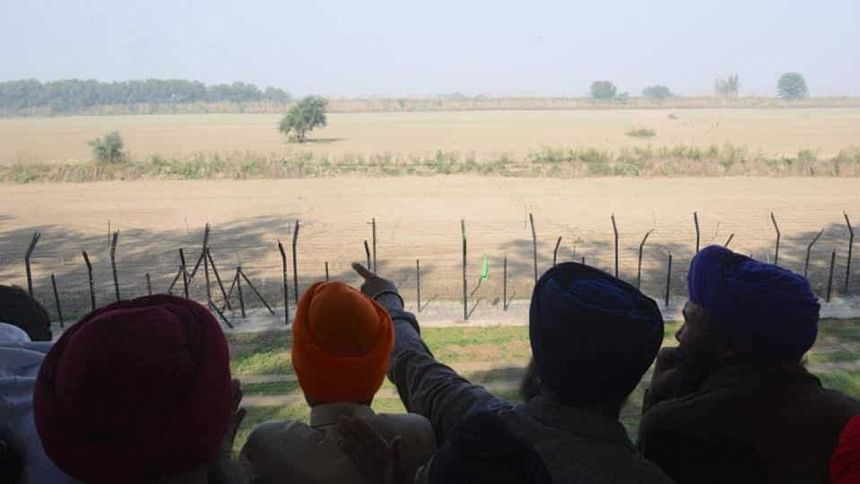Can a religious corridor end India-Pakistan deadlock?

Prime Minister Narendra Modi seems to have a penchant for springing surprises when it comes to foreign policy, especially with Pakistan. Take for example his decision to invite all heads of states and governments of South Asian countries to his swearing in, his unannounced stop-over in Lahore on his return home from Kabul to wish the then Pakistan PM Nawaz Sharif on his birthday, and India's readiness to a foreign minister-level meeting with Pakistan in September this year (which, of course, was scrapped by India the very next day). The latest addition to this was the Indian cabinet's decision taken on November 22 to build a cross-border corridor up to the international border for pilgrimage to the Sikh holy shrine in Kartarpur Sahib located in Pakistan's Punjab province where Guru Nanak Dev, the founder of Sikh religion, spent the last 18 years of his life.
What makes the cabinet decision surprising is that it comes at a time when relations between India and Pakistan are at an all-time low, ever since the major terror attack by 10 Lashkar-e-Taiba terrorists on India's financial hub Mumbai a decade ago that left 166 people dead. In fact, just a day after the Indian cabinet's decision, India lodged a strong protest with Pakistan for "harassing and preventing" its consular officials from meeting Sikh pilgrims visiting Pakistan on November 21 and 22. The "harassment" of Indian consular staff in Pakistan is, of course, nothing new. In fact, the statement by the Indian External Affairs Ministry pointed out that the "harassment" was meted out for the third consecutive visit of Indian Sikh pilgrims to their shrines in Pakistan. India made it clear that Pakistan was in breach of the 1974 Bilateral Protocol on Visit to Religious Shrines, which at present guides religious tourism between the two countries, and the code of conduct for treatment of each other's diplomatic/consular personnel. It is under the 1974 Protocol that groups of Sikhs from India undertake pilgrimage to various shrines in Pakistan every year, including Nankana Sahib, the birthplace of Guru Nanak.
Besides, only last week, a terror attack on a religious gathering of a Sikh sect near Amritsar, bordering Pakistan, left three people dead with Amarinder Singh and the Indian security establishment pointing the finger at the involvement of Sikh separatists and saying that the planning was done in Lahore. During the height of Sikh separatist militancy in the Indian part of Punjab in 1980s, Pakistan had been a key base for the separatists. Just a few days ago, banners hailing Sikh separatist movement for Khalistan greeted the Sikh pilgrims from India. The Indian security set-up is convinced that Pakistan uses the Sikh pilgrims to try and indoctrinate them for anti-India activities. So, how does the diplomatic initiative for a religious corridor play out in this gloomy backdrop of India-Pakistan ties?
Kartarpur Sahib, the final resting place of Guru Nanak, is just about three kilometres from Dera Baba Nanak in the border district of Gurdaspur in the Indian state of Punjab. About 2.5km of the proposed religious corridor is on the Indian side and a religious corridor connecting the two places has been a long-pending demand of Sikhs and the Indian government.
The Indian cabinet's decision on the religious corridor was taken keeping in mind the 550th birth anniversary of Guru Nanak next year. Soon after the decision, the Punjab state government in India issued a statement announcing that President Ram Nath Kovind and Punjab Chief Minister Amarinder Singh would lay the foundation stone of the corridor's construction on the Indian side on November 26. What is equally interesting is that hours after the Indian government went public with the corridor decision, Pakistan's Foreign Minister Shah Mehmood Qureshi tweeted that his country has already conveyed to India to open the corridor on Pakistani territory and that Prime Minister Imran Khan would do the ground-breaking for the same on November 28. The swiftness of decisions on both sides of the border is noteworthy, knowing fully well that these are not the best of times in the bilateral relationship for initiating a people-centric move like a religious corridor. Equally noteworthy is that the Indian cabinet's decision comes ahead of next year's parliamentary elections.
It was speculated that the Modi government will be wary of the risk of failure of any fresh initiative to improve ties with Pakistan, particularly in an election year. That line of thinking gained ground after the abrupt cancellation of the meeting between the foreign ministers of the two countries on the margins of the UN General Assembly in New York in September. That meeting might have taken up the issue of the religious corridor as a confidence-building measure.
The question is that given the deep-running hostility and mutual mistrust on a wide range of issues in India-Pakistan ties, how effective will the construction of a cross-boundary religious corridor be in pulling bilateral ties out of the deep stupor? Also, history demonstrates that peace and confidence-building measures at the bilateral level have faltered a number of times between the two. At home, will the Kartarpur corridor spin off electoral benefits from one of India's biggest religious minorities?
Modi appears to be an indefatigable optimist when it comes to investing in improving India-Pakistan relations. Significantly, at a function in New Delhi to mark the birth anniversary of Guru Nanak on November 23, two days after his cabinet's nod to the pilgrimage corridor, Modi said, "who thought that the Berlin Wall would fall? May be, with the blessings of Guru Nanak Devji, Kartarpur corridor will not only be a corridor but can become a major reason for connecting the people." The distance between a corridor and the huge expanse of sharp bilateral differences is full of lurking dangers that the two countries must carefully tread.
Pallab Bhattacharya is a special correspondent at The Daily Star.





Comments